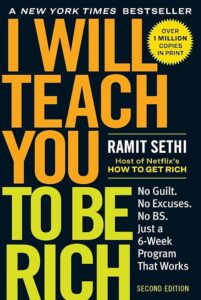
I Will Teach You to Be Rich: No Guilt. No Excuses. Just a 6-Week Program That Works (Second Edition)
Chapter 4: Conscious Spending
by DenzelleChapter 4 introduces the concept of Conscious Spending, a strategy designed to empower individuals to manage their finances without feeling restricted or deprived. Unlike traditional budgets, which often evoke dread and feel like a list of prohibitions, conscious spending focuses on purposeful and guilt-free financial decisions. This approach blends saving for the future with indulging in what truly matters, offering a practical and sustainable path to financial well-being.
The chapter opens with a vivid anecdote involving chicken wings, using this simple example to demonstrate how small, everyday actions reflect broader financial habits. The story draws parallels between mindful thrift and the practices of many immigrants, who prioritize resourcefulness and avoid unnecessary waste. This perspective underscores a critical lesson: being conscious about how you use your money is a cornerstone of effective financial management.
The author critiques traditional budgeting, describing it as too restrictive and often unsustainable for the average person. Instead, they introduce the Conscious Spending Plan, a flexible framework that divides income into four key categories:
- Fixed Costs – Essential expenses like rent, utilities, and insurance.
- Investments – Contributions to retirement accounts and other wealth-building tools.
- Savings Goals – Prioritized funds for emergencies, vacations, or big purchases.
- Guilt-Free Spending – Money allocated for hobbies, dining out, and personal indulgences.
This plan is customizable, allowing individuals to adjust percentages based on their priorities and lifestyle, making it more adaptable than one-size-fits-all budgeting.
A crucial point in the chapter is distinguishing between being cheap and being a conscious spender. While a cheap approach focuses solely on minimizing expenses, conscious spending involves making deliberate choices that align with personal values. For instance, someone might cut back on less meaningful purchases like subscription services but splurge on travel if it brings joy and fulfillment. This mindset shift helps individuals embrace a personalized “rich life” that resonates with their goals.
Through personal stories and testimonials, the chapter illustrates how conscious spending varies from person to person. For some, a rich life might mean frequent vacations, while for others, it could be about building a dream home or pursuing a passion project. These examples reinforce that financial success is subjective, and the Conscious Spending Plan encourages readers to tailor their strategies to fit their unique aspirations.
The author also challenges the common assumption that earning more money directly correlates with increased happiness. Studies show that beyond a certain threshold, additional income has diminishing returns on emotional well-being. Instead, the chapter advocates for using money strategically, focusing on areas that genuinely enhance satisfaction, such as freeing up time, enjoying experiences, or achieving financial security.
Practical advice is provided to help readers implement conscious spending effectively. Tips include negotiating raises to increase income, handling unexpected expenses with confidence, and reallocating funds to maximize financial outcomes. The chapter emphasizes prioritizing “big wins,” such as selecting the right mortgage, reducing high-interest debt, or choosing investments with long-term impact, as these decisions yield greater benefits than micromanaging small expenses.
The chapter brings its strategies to life through relatable scenarios and dialogues. For example, it includes scripts for negotiating a raise or politely declining unnecessary purchases, equipping readers with actionable tools to handle everyday financial situations. These practical examples make the concepts accessible and easy to implement, even for those new to financial planning.
Ultimately, Chapter 4 positions conscious spending as a gateway to financial freedom and a richer, more fulfilling life. By critically assessing their spending habits and aligning them with their values, readers can achieve a guilt-free lifestyle that balances responsibility with enjoyment. The framework encourages deliberate, value-driven choices, redefining what it means to live a financially successful life.
Conscious spending is more than just a financial strategy—it’s a mindset that empowers individuals to prioritize what truly matters. By creating a plan that includes saving, investing, and guilt-free indulgences, readers can break free from the limitations of traditional budgeting. Chapter 4 inspires a shift toward intentional financial decisions, enabling readers to build a sustainable and meaningful version of their “rich life.”


0 Comments